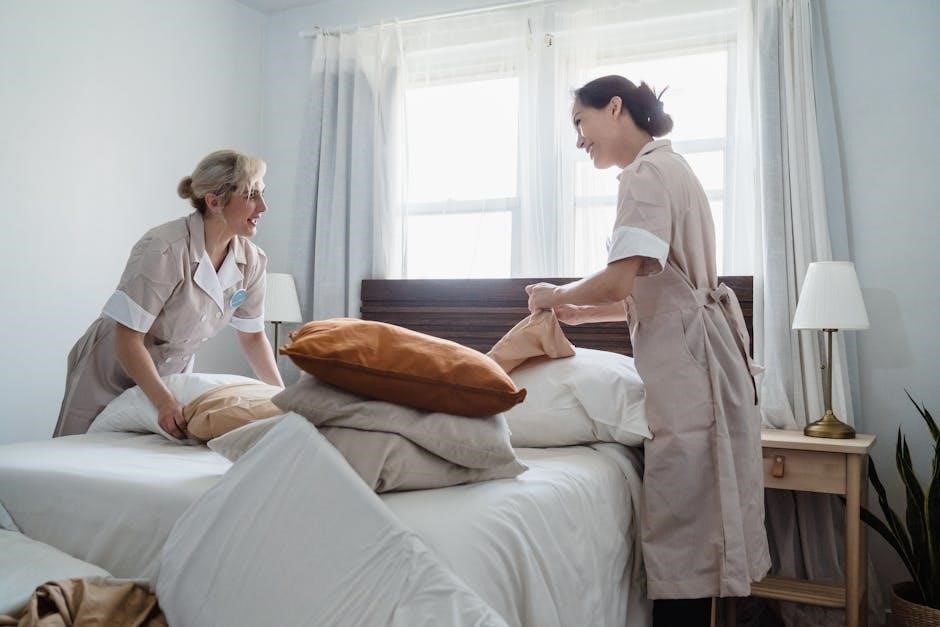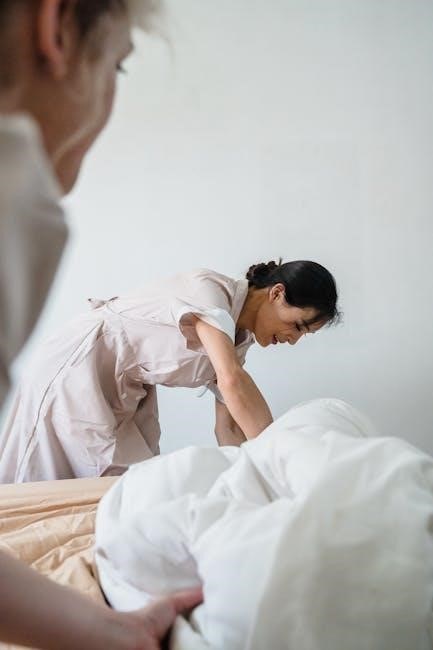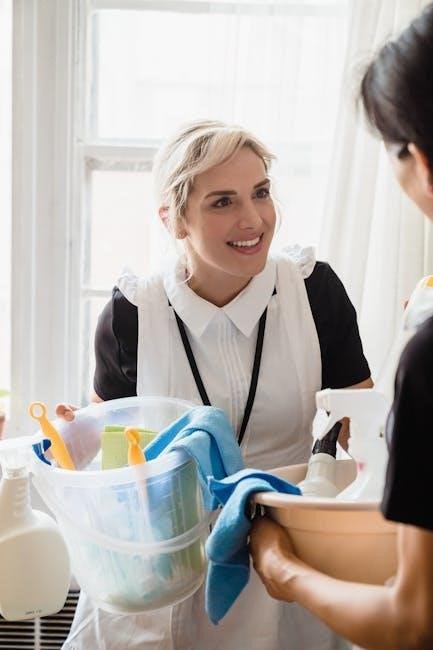Executive Housekeeper / Director of Housekeeping
The Executive Housekeeper oversees all housekeeping operations, ensuring high standards of cleanliness and aesthetics. They supervise staff, manage daily schedules, inspect contractors’ work, and report to the General Manager.
1.1. Supervising Housekeeping Staff
The Executive Housekeeper is responsible for supervising all housekeeping staff, ensuring efficient coordination of daily tasks. This includes assigning work assignments, monitoring performance, and addressing any issues. They also handle recruitment, training, and disciplinary actions if necessary. The role involves fostering a motivated team environment and ensuring staff adhere to hotel regulations and quality standards. Regular inspections and feedback sessions are conducted to maintain high service levels. The Executive Housekeeper also ensures that staff are aware of their responsibilities and work collaboratively to achieve operational goals. Effective communication and leadership are key to managing a productive and aligned housekeeping team.
1.2. Ensuring Cleanliness and Aesthetic Upkeep
The Executive Housekeeper is tasked with maintaining the highest standards of cleanliness and aesthetic upkeep throughout the hotel. This involves monitoring guestrooms, public areas, and back-of-house spaces to ensure they meet quality expectations. They implement cleaning protocols, inspect facilities regularly, and address any discrepancies promptly. Aesthetic upkeep includes ensuring decor is well-maintained, linens are crisp, and amenities are replenished. The role also involves coordinating with other departments to maintain a cohesive and inviting environment. By focusing on both functionality and visual appeal, the Executive Housekeeper ensures the hotel presents a polished image to guests and supports overall guest satisfaction. This responsibility is critical to the hotel’s reputation and operational success.
1.3. Managing Staff Schedules and Duty Rotas
The Executive Housekeeper is responsible for creating and managing staff schedules and duty rotas to ensure seamless operations. This involves planning work shifts, balancing staff availability, and adjusting schedules based on occupancy levels and special events. They ensure adequate coverage during peak times and handle staff leave requests. Effective communication is key to informing team members about their duties and any changes. The Executive Housekeeper also uses digital systems or manual records to track schedules and maintain fairness in workload distribution. This role requires strong organizational skills to align staffing needs with operational demands, ensuring high service standards are consistently met. Proper scheduling is vital for maintaining cleanliness and efficiency across all areas.
1.4. Inspecting Work Done by Contractors
The Executive Housekeeper is tasked with inspecting work done by contractors to ensure it meets hotel standards. This includes evaluating services like pest control, laundry, and window cleaning. They verify that all contracted tasks are completed efficiently and to the required quality. If any issues are identified, the Executive Housekeeper addresses them promptly to maintain guest satisfaction. This role involves documenting findings and providing feedback to contractors to improve future performance. Regular inspections ensure compliance with hygiene and safety protocols, protecting the hotel’s reputation and operational excellence. The Executive Housekeeper acts as a liaison to resolve any discrepancies and ensure third-party services align with the hotel’s expectations.

Housekeeper
The Housekeeper is responsible for performing routine cleaning tasks, restocking supplies, maintaining public areas, and adhering to safety and hygiene protocols to ensure a clean environment.

2.1. Performing Routine Cleaning Tasks
The primary responsibility of a Housekeeper is to perform routine cleaning tasks efficiently. This includes cleaning guestrooms, bathrooms, and public areas such as lobbies, corridors, and stairways. They ensure surfaces are dusted, floors are mopped or vacuumed, and trash is disposed of properly. Housekeepers also clean mirrors, windows, and other glass surfaces to maintain a polished appearance. Additionally, they sanitize high-touch areas to adhere to safety and hygiene protocols. Using appropriate cleaning supplies and equipment, they ensure all spaces are spotless and well-maintained. Their attention to detail and commitment to cleanliness contribute significantly to the overall guest experience and facility upkeep.
2.2. Restocking Items in Rooms and Bathrooms
A key responsibility of Housekeeping staff is restocking essential items in guestrooms and bathrooms. This includes replacing toiletries, linens, and beverages to ensure guest comfort. They replenish toilet paper, soap, shampoo, and towels, while also restocking mini-bars and beverage stations. Housekeepers ensure that all items are neatly arranged and easily accessible. Maintaining adequate supplies is crucial for guest satisfaction. Additionally, they check for any missing items and report shortages to the supervisor. This task requires attention to detail and efficiency to ensure rooms are always well-stocked and presentable. Restocking is a vital part of housekeeping, contributing to a seamless and enjoyable experience for guests.
2.3. Maintaining Public Areas
Housekeeping staff are responsible for ensuring the cleanliness and organization of all public areas within the facility. This includes lobbies, corridors, stairways, elevators, and common rooms. Duties involve vacuuming, mopping, and dusting surfaces, as well as emptying trash and recycling bins. They sanitize high-touch areas, such as handrails and door handles, to maintain hygiene. Additionally, staff restock supplies in public spaces, like tissues and sanitizers, and ensure furniture and decorations are tidy. Maintaining public areas requires attention to detail to create a welcoming environment for guests and residents. Regular inspections are conducted to address any cleanliness issues promptly. This role is essential for upholding the facility’s aesthetic and functional standards.
2.4. Adhering to Safety and Hygiene Protocols
Housekeeping staff must strictly follow safety and hygiene protocols to maintain a clean and secure environment. This includes using personal protective equipment (PPE) such as gloves and masks when handling chemicals or cleaning contaminated areas. Staff are trained to follow proper cleaning and disinfection procedures, especially in high-touch zones like doorknobs and light switches. They ensure compliance with health and safety regulations, such as proper chemical storage and disposal. Regular handwashing and sanitizing of equipment are emphasized to prevent the spread of infections. By adhering to these protocols, housekeeping staff contribute to a safe and hygienic environment for guests, residents, and colleagues; These practices are critical for preventing contamination and ensuring overall well-being.
Assistant Housekeeper
The Assistant Housekeeper supports senior staff, coordinates daily tasks, and trains new employees. They ensure efficient operations and maintain high cleanliness standards, assisting in staff supervision and scheduling.
3.1. Supporting Senior Housekeeping Staff
The Assistant Housekeeper plays a crucial role in supporting senior housekeeping staff by assisting with daily coordination and ensuring smooth operations. They help in delegating tasks, monitoring progress, and addressing any issues that arise. This includes aiding in staff supervision, managing workload distribution, and stepping in during the absence of the Deputy Housekeeper. Their support enables senior staff to focus on strategic decisions and maintaining high service standards. By handling administrative and operational tasks, they contribute to the overall efficiency of the housekeeping department. Their role is essential for maintaining consistency and ensuring that all responsibilities are fulfilled effectively.
3.2. Coordinating Daily Housekeeping Tasks
The Assistant Housekeeper is responsible for coordinating daily housekeeping tasks to ensure efficient operations. This involves organizing and distributing work assignments among the housekeeping team, ensuring all areas are cleaned to the highest standards. They communicate with other departments, such as front desk and maintenance, to address guest requests and resolve issues promptly. By monitoring progress and addressing any discrepancies, they maintain consistency and quality in service delivery. Their role is pivotal in ensuring seamless execution of daily tasks, upholding the establishment’s cleanliness and aesthetic standards. Effective coordination by the Assistant Housekeeper enhances overall guest satisfaction and operational efficiency.
The Assistant Housekeeper plays a crucial role in training new staff members to ensure they meet the hotel’s standards. They conduct orientation sessions, demonstrate cleaning techniques, and explain safety protocols. By providing hands-on training, they help new employees understand their duties and the importance of maintaining cleanliness and hygiene. This includes teaching proper use of cleaning equipment and chemicals, as well as outlining procedures for handling linens and waste. Effective training ensures consistency in service delivery and prepares staff to handle daily tasks efficiently. This role is essential for building a skilled and confident housekeeping team, contributing to overall guest satisfaction. Housekeeping staff may handle laundry, maintain back-of-house areas, and report maintenance issues to ensure overall property upkeep and guest satisfaction. Housekeeping staff is responsible for managing laundry and linen duties, ensuring clean towels and bed linens are available. They collect soiled items, operate washing machines, and distribute fresh supplies to rooms and public areas. Proper handling of delicate fabrics and maintaining hygiene standards are essential. This duty ensures guest comfort and satisfaction. Additionally, staff must monitor linen inventory, report shortages, and maintain storage areas. Efficient management of laundry services is crucial for the smooth operation of the establishment. Housekeeping staff is responsible for ensuring the cleanliness and organization of back-of-house areas, including storage rooms, staff rooms, and laundry facilities. These areas must be kept tidy to maintain hygiene and safety standards. Duties include emptying trash cans, restocking supplies, and ensuring proper labeling of stored items. Additionally, staff must clean floors, dust surfaces, and maintain proper ventilation in these areas. This role supports the smooth operation of the housekeeping department by ensuring all behind-the-scenes spaces are functional and contribute to efficient service delivery. Proper upkeep of these areas also promotes a safe and organized working environment for all staff members. Housekeeping staff must identify and report any maintenance-related issues in guest areas, public spaces, or back-of-house regions; This includes leaks, broken fixtures, or damaged furniture. Timely reporting ensures prompt resolution, preventing further damage or safety hazards. Staff should document the issue, noting the location and severity, and escalate it to the maintenance or engineering team. This duty is crucial for maintaining property integrity and guest satisfaction. By addressing these issues early, housekeeping contributes to a well-functioning and safe environment for both guests and staff. Regular checks and proactive reporting are essential to uphold high standards of facility upkeep.3.3. Providing Training to New Staff Members

Additional Responsibilities
4.1. Handling Laundry and Linen Duties
4.2. Maintaining Back-of-House Areas

4.3. Reporting Maintenance Issues
